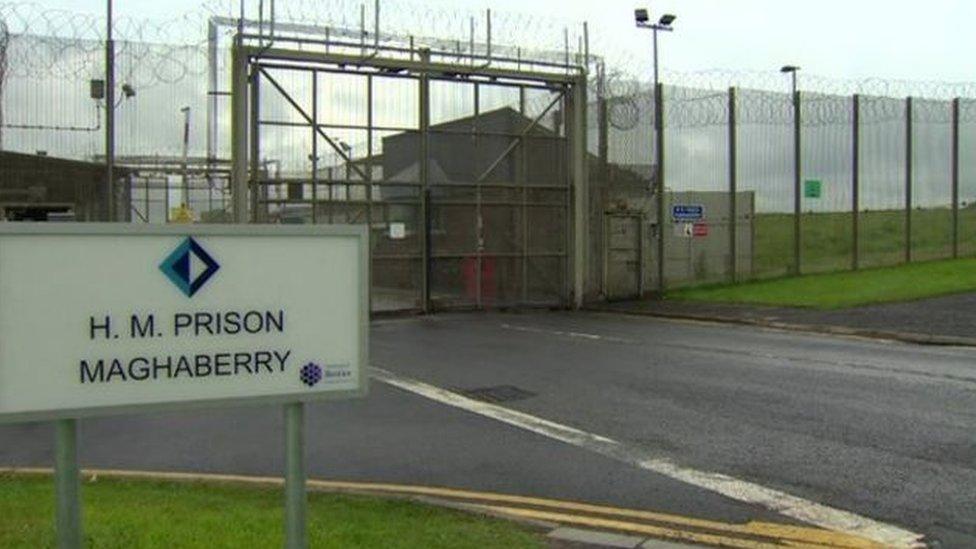Sue McAllister to step down as head of NI Prison Service
- Published

Sue McAllister was the first woman to hold the most senior position within a prison service in the UK
The head of Northern Ireland's prison service has announced she will step down in October.
Sue McAllister was appointed director general in 2012 and became the first woman to hold the most senior position within a prison service in the UK.
Last November, an inspection report was highly critical of prison leadership, finding that Maghaberry prison was the most dangerous prison ever inspected.
The justice department is to begin a search for her successor in September.
'Natural end'
Mrs McAllister said it had been a "great privilege" to work in the role.
She said her focus had been to lead the "transformational reform envisaged in the prison review report".
"With the conclusion of the reform programme in March, my role has come to a natural end and the time is right for a new director general to lead the service."

Prison officers David Black (left) and Adrian Ismay died after attacks by dissident republicans
Justice Minister Claire Sugden said Mrs McAllister should be "proud of what she has achieved in her time as director general".
"The role of director general is a uniquely challenging post and Sue McAllister has led the organisation through the reforms, which have placed rehabilitation at the core of its work," added Ms Sugden.
Her predecessor, David Ford, said she had "delivered a successful reform programme to the Prison Service, the benefits of which would continue to be seen".
The DUP's Edwin Poots said her resignation "creates the opportunity for a new broom".
He added: "It is critical that attention is given to the foot soldiers in the Prison Service who are working in trying conditions, facing constant threats, verbal abuse, and physical attacks."
Mrs McAllister's four years in the role coincided with an increased threat to prison officers from dissident republican paramilitaries.
'Tremendous shock'
In 2012, prison officer David Black was shot dead as he drove to work.
He was the first member of the Northern Ireland Prison Service to be murdered in nearly 20 years.
Earlier this year, prison officer Adrian Ismay died of a heart attack a month after being injured in a dissident republican bomb attack.
"The murders of David Black and Adrian Ismay were despicable and an attack on the whole community," said Mrs McAllister.
"Both came as a tremendous shock and I want to pay tribute to their families, friends and colleagues.
"Working in prisons in Northern Ireland is different and I have always been hugely impressed by the courage, professionalism and dedication of my colleagues.
"They play a crucial part in making Northern Ireland a safer place and I want to thank them all for their hard work over the last four years."

A team of more than 20 inspectors spent almost two weeks assessing conditions at Maghaberry Prison, near Lisburn, in May 2015
Last November, Her Majesty's Chief Inspector of Prisons in England and Wales, Nick Hardwick, published a damning report following its inspection of Northern Ireland's only high-security jail, Maghaberry Prison.
The County Antrim jail houses men convicted of serious and violent offences, including paramilitary prisoners.
Mr Hardwick said Maghaberry was the "most dangerous prison" he had ever been in during his time as a chief inspector.
His report concluded the jail was in a "state of crisis" and was "unsafe and unstable" for prisoners and staff.
After a follow-up inspection in February this year, inspectors said the situation has improved, but would still only give it four marks out of 10.
- Published15 March 2016

- Published1 November 2012
.jpg)
- Published31 May 2012
